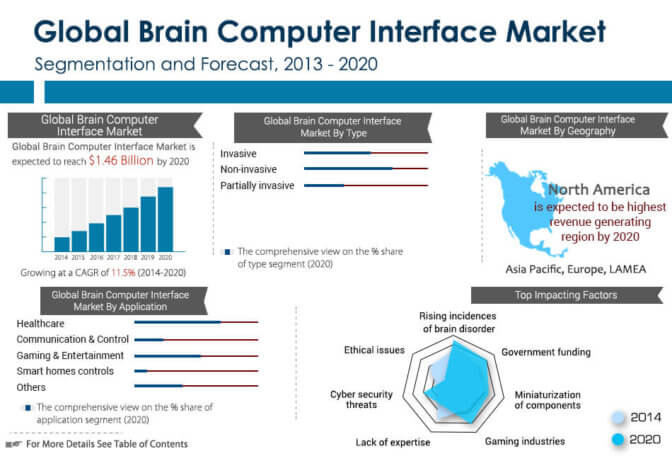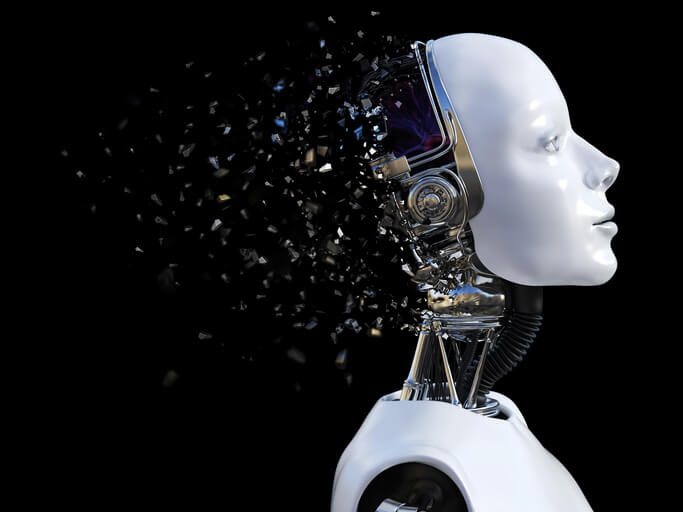State-of-the-art in neuroprosthetics and Brain-Computer Interfaces
The Brain-Computer interface which in some cases is referred to as a mind-machine interface is an expressly connected communication link that exists between a wired or an enhanced human brain and an electronic device. This technology is however similar to neuromodulation nevertheless, the brain-computer interface differs from neuromodulation owing to its ability to process information in bi-directionally.
The brain-computer interfaces are mostly employed for research purposes, mapping and for the repairs of the human sensory-motor system.
The function of the brain-computer interface is anchored on the presence of neurons in the human brain. These are individual nerves that are linked to each other through dendrites and axons. For a human being to successfully perform a task, electrical signals are transmitted at an extremely high speed of about 250mph between neurons each time we think or remember something. Since the membrane of each neuron has an ion, these transmitted signals are generated by the potential difference between these ions.
Even though these electric signals are protected by myelin, some of the transmitted signals still leak out before reaching their destination. The brain-computer technology utilizes these leaked signals by interpreting what they are meant for and directing them towards controlling certain computer functions.
The primary purpose of the brain-computer interfaces is to assist people suffering from neuromuscular disorders to perform basic functions. The brain-computer interface is applicable to healthcare for prevention, detection and diagnosis as well as rehabilitation and restoration. This technology has become useful for stroke rehabilitation as well as other forms of health disorders.
The interface has been envisaged to supplement the functions of a surgeon as well as other medical experts. Consequently, the integration of the brain-computer interface into healthcare will assist critically disabled patients to perform some function on electronic devices as well as help the medical professionals to seamlessly carry out their duties.
At the present, there are about 10 major startups in this field, however, this number is hoped to double in the nearest future. In 2017, the brain-computer interface had a market value of $0.696 billion. This is, however, envisaged to reach a value of $1.46 billion by the year 2020.

Image courtesy of Allied Market Research
Key players and innovative startups in Neuroprosthetics
- Neuralink: This is one of the major neuroprosthetics companies owned by Elon Musk. The company has decided to advance healthcare through the development of what it calls the neura-lace which is an advanced technology to assist the physically challenged and disabled persons to control many electronic and computer devices with their eyes.
- Kernel: This is another neuroprosthetic company established by Bryan Johnson with the goal of retaining the human brain vitality while unlocking its full potentials and capabilities. The company’s target is to repair damaged neurons occasioned by certain diseases like Alzheimer’s and other neurological damaging diseases. The implantation chips being built by the company is hoped to boost memory and improve human intelligence.
- BrainCo: This neuroprosthetic company has designed an amazing product which it calls the Edu headband. This product improves the outcomes of education by taking the measurement of the level of engagement of students through their brain waves. The uniqueness of this product is that it does not have to be implanted, rather it is worn externally.
- Neurable: This is a neuroprosthetic company that is focused on relying on existing electroencephalography instead of building new hardware, unlike many other startups. The company utilises this platform to interpret neural activities and assist people with severe disabilities.
- Delta Brain Inc: The Delta Brain Inc is a startup in the neuroprosthetic field that has over the years focused its research on improving heart health. This has really helped a lot of people with heart and liver conditions to live longer than they would have.
- Novela: This is another renown company in the neuroprosthetic field that developed a flexible electrode array that successfully created a closed loop system for the detection and stoppage of seizures.
- Brains view: This startup company has been involved in the development of a system that helps doctors in performing their duties easily.the company’s Matlab based software has been designed to be able to predict the outcomes of paediatric traumatic brain injuries.
- Eyewink: This is another impressive startup in the neuroprosthetic field that has been able to amazingly design a system that gives humans the ability to control devices with the wink of the eye.
Challenges associated with Brain-Computer Interfaces
There are various challenges that are faced by the startups in the brain-computer interfaces. Some of these include:
- Scientific challenge: There is the question of how advanced does the brain need to be before we can really understand its intentions from its electrical activities? The inability to precisely provide an answer to this question has remained a challenge to the brain-computer interface startups.
- Data acquisition and interpretation: The relatively low ability to extract the relevant information from the brain is a key challenge that thee startups are still battling to overcome. The present method employed in brain data collection from the invasive to the non-invasive methods only produces partial and unclear data on the subject’s intention. This has been a barrier to the success of the technology.
- Cybersecurity threat: The ever-increasing cyber threat is a major challenge to the startups of this industry because there is the continuous fear of data theft which may cause severe damage to the industry’s reputation.
- Ethical Issues: There is also the challenge of right and wrong by many who believe the technology is an attempt by humans to play god. Some others have been opposed to the brain-computer interfaces on the basis that some private and personal data about them can be accessed by unauthorised persons. This has been a challenge the industry startups are trying to overcome.
- Legality: There is also the challenge of legality and regulations which the industry startups have been trying to overcome. There basic human right laws that must not be violated by the use of this technology. However, with the ever-rising cyber threats, the startups have to work on guaranteeing basic human rights.

Image courtesy of Allied Market Research
What to expect in the future?
The brain-computer interfaces is an advanced technology that has been designed to assist the physically disabled people to control electronic devices with their minds. The industry was valued at $0.696 billion in 2017 and envisaged to reach a value $1.46by 2020. This technology has proven to be of vital importance in the health care for prevention, detection and diagnosis of certain medical conditions.
The startups in this industry have been faced with series of challenges which include legal, socio-economic and ethical among others previously mentioned which they need to overcome to truly realise the potential of this disruptive technology.
Image credit: www.istockphoto.com


















Interesting news!! Brain-Computer Interface Market is a huge market with its many end users. A happen to stumble upon a report on valuemarketresearch.com which has a report which evaluates the report across. A must read for a market entrant.